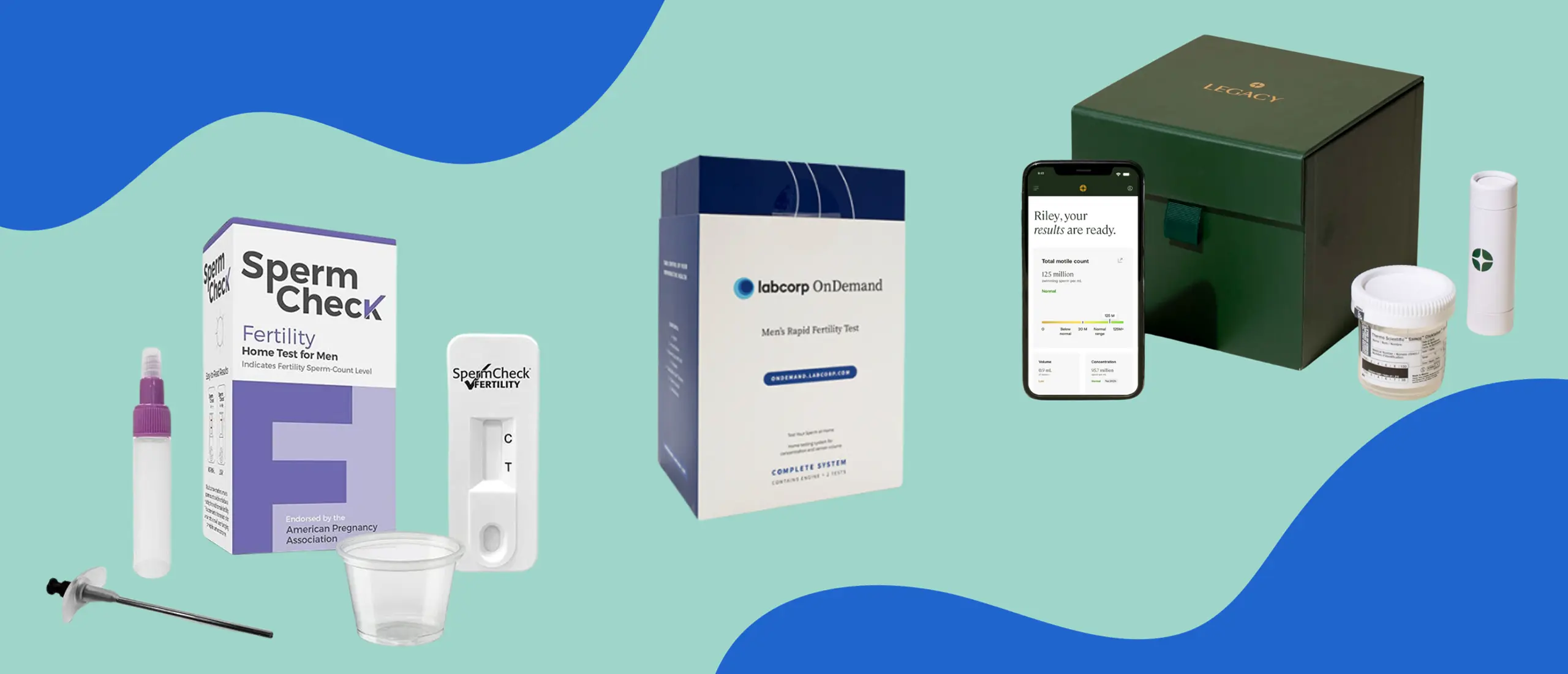The Best At-Home Sperm Tests to Kickstart Your Fertility Journey
- By Taneia Surles, MPH
- December 1, 2023
Male fertility challenges are more common than you think.
Within the past 40 years, sperm count and quality have decreased significantly globally. Potential reasons for this include exposure to endocrine-disrupting chemicals, obesity, and delayed parenthood. And not to mention 1 in 6 couples wanting to conceive are diagnosed as infertile (1).
If you’re ready to expand your family but aren’t sure if infertility could hinder your journey, at-home sperm tests are worth considering.
We’ve combed through several tests to provide you with a roundup of the best at-home sperm tests for family planning, and compiled the latest research on the subject to boot. Here’s what you need to know.
Our picks:
Best for Fast Results: Labcorp OnDemand Men’s Rapid Fertility Test
Most Affordable: SpermCheck Fertility Home Test Kit for Men
Most Discreet: myLAB Box Male Fertility Test
Best for Couples: Proov Hers and His Fertility Starter Kit
Best for Post-Vasectomy: Fellow Vasectomy Test
Best Test with Sperm Freezing: Legacy Standard Semen Analysis
Best for Hormone Testing: LetsGetChecked Male Hormone Advanced
Best Semen Analysis: Fellow Semen Analysis
About the Expert:
Dr. Danae Maragouthakis, BS, MPH, MS, MBBS, is an NHS medical doctor working in Emergency Medicine with a background in Public Health, as well as the CEO and co-founder of Yoxly. She’s worked in healthcare for more than two decades and is a member of the British Association for Sexual Health and HIV (BASHH).
What Are At-Home Sperm Tests?
What do at-home sperm tests do?
As the name suggests, an at-home sperm test lets you know whether or not sperm is present in your semen. Some tests can provide a deeper analysis of your sperm, but we will get more into that later. Overall, this can be a helpful test to better understand your sperm fertility (2).
Who are at-home sperm tests for?
At-home sperm tests are for individuals or couples who want to understand the quantity and quality of their sperm. Typically, people will use these tests because they want to expand their family, but they can also help verify the success of a vasectomy (3).
How accurate are at-home sperm tests?
Well, if you believe the brands’ claims of an almost 100 percent accuracy rate, you could say you’ll get a solid semen analysis you can trust. In reality, there are just not enough studies available at this time to determine the actual accuracy of these at-home sperm tests—so take that as you will.
What do at-home sperm tests measure?
“Different tests may measure different parameters that contribute to sperm health and can impact fertility,” says Dr. Danae Maragouthakis, BS, MPH, MS, MBBS, an NHS medical doctor and the CEO and co-founder of Yoxly, a company that makes at-home sexual health kits.
Dr. Maragouthakis explains the following as the most common parameters at-home sperm tests measure:
- Semen volume: “Typically, [your semen volume] is greater than 1.5 milliliters,” she says. “Producing less than 1.5 milliliters is called ‘hypospermia.’”
- Sperm concentration: This is popularly known as “sperm count.” “A ‘normal’ sperm count has at least 15 million sperm per milliliter of semen,” she adds. “A sperm count less than this is considered ‘low,’ and called ‘oligozoospermia.’”
- Sperm motility: Dr. Maragouthakis explains that this is the sperm’s ability to move. “Sperm should be able to swim quickly and in a forward motion. If less than 40 percent of sperm are motile, or if less than 32 percent of sperm exhibit progressive motility, this is called ‘asthenozoospermia.’”
Some at-home sperm tests may also examine the following: (4)
- Sperm morphology
- pH level
- How quickly semen changes from a sticky substance to a liquid form
- Vitality (amount of live sperm in your sample)
- White blood cells (to see if infection is present)
The Best At-Home Sperm Tests for Every Person
Will insurance cover at-home sperm tests?
It depends. Some insurances will fully or partially cover the costs, while others don’t provide coverage at all. A few tests on our list are eligible for FSA/HSA, which can make them more affordable.
It’s best to double-check with your provider to find out if at-home sperm tests are covered under your plan.
How long does it take to receive test results?
Depending on which test you go with, you can receive results within a few minutes up to a day or two once a lab has analyzed your sample.
How can someone prepare for an at-home sperm test?
To get ready, try to refrain from any sexual activity (sorry!) that can lead to ejaculation for two to three days before taking the test. But don’t go longer than five days, as this can affect the quality of your sperm (6).
What are the benefits of taking an at-home sperm test?
The biggest benefit of taking an at-home sperm test is to discover if there’s an underlying problem affecting your sperm quality. And as mentioned before, this type of test can verify whether or not a vasectomy was successful (6).
Additional benefits of an at-home sperm test include: (7)
- Some control and responsibility for your own health and fertility journey
- Convenience (no need to visit your doctor’s office or a fertility clinic)
- Privacy
How do you do an at-home sperm test?
To conduct an at-home sperm test, collect a sample of your semen by ejaculating in a cup (2). The cup should be provided in the kit from the brand you purchased. The next steps can vary depending on the kit, but typically, you’ll then send off your sample to a lab where they’ll analyze your semen.
Can at-home tests determine if someone is infertile? Why or why not?
Yes, but they shouldn’t be the end-all-be-all. Some of the tests listed above have been analyzed in clinical trials and are FDA-approved. That’s great, but they still aren’t reliable enough.
There’s just not enough research-backed information available to confirm if at-home sperm tests are a one-stop-shop for male infertility.
Also, many tests don’t examine every aspect of your sperm health—which is crucial when you want to know whether or not you’re fertile.
“At-home sperm tests are a great place to start,” Dr. Maragouthakis says. “However, it’s important to remember that they don’t test for everything. Other factors contribute to sperm health and can affect fertility.”
What are the next steps after taking an at-home sperm test?
Once you’ve completed an at-home sperm test, Dr. Maragouthakis recommends speaking with your doctor to discuss your results and any fertility concerns you may have.
References
1. Ravitsky, Vardit et al (2019). The forgotten men: rising rates of male infertility urgently require new approaches for its prevention, diagnosis and treatment. https://academic.oup.com/biolreprod/article/101/5/872/5551192
2. Mayo Clinic (2022). Is a home sperm test useful? https://www.mayoclinic.org/diseases-conditions/low-sperm-count/expert-answers/home-sperm-test/faq-20057836#
3. Cleveland Clinic (2019). At-Home Sperm Tests Can Be Useful, But They Don’t Replace a Fertility Doctor. https://health.clevelandclinic.org/at-home-sperm-tests-can-be-useful-but-they-dont-replace-a-fertility-doctor
4. Cleveland Clinic (2021). Semen Analysis. https://my.clevelandclinic.org/health/diagnostics/21520-semen-analysis
5. Cleveland Clinic (2022). Hormonal Imbalance. https://my.clevelandclinic.org/health/diseases/22673-hormonal-imbalance
6. MedlinePlus (2022). Semen analysis. https://medlineplus.gov/ency/article/003627.htm
7. Australian Government Department of Health and Aged Care (2023). What you need to know about at home semen tests for male fertility. https://www.healthymale.org.au/news/what-you-need-know-about-home-semen-tests-male-fertility












